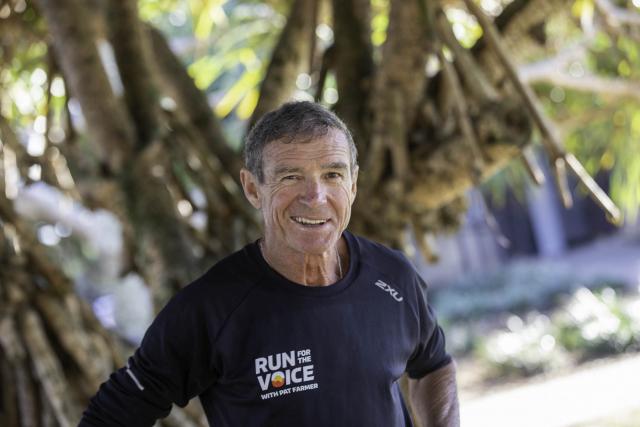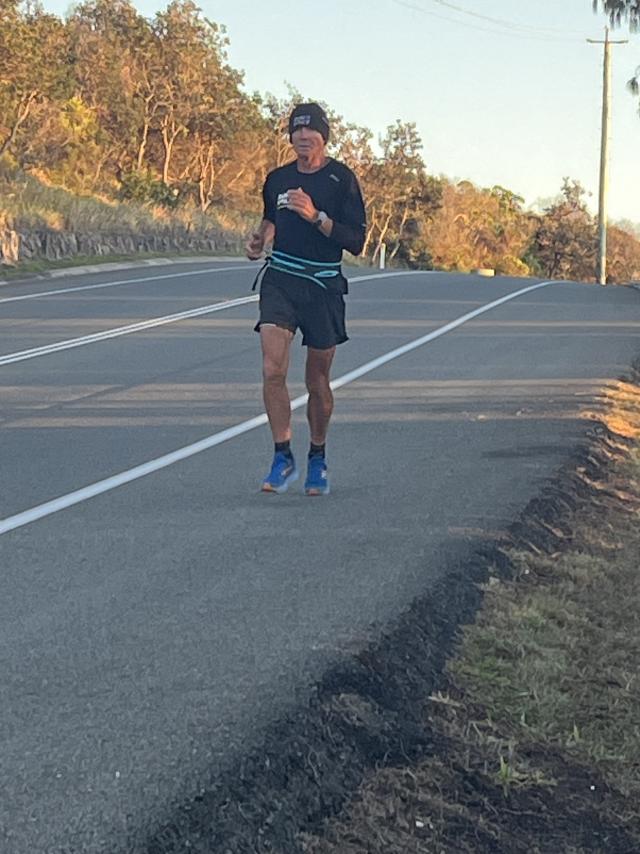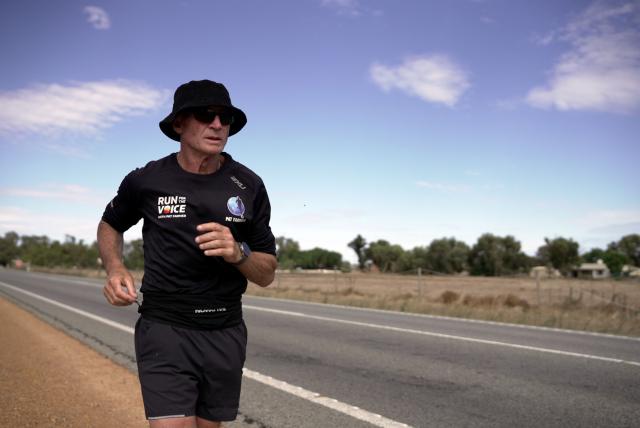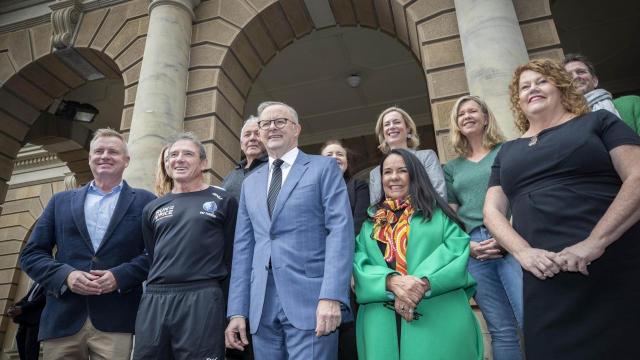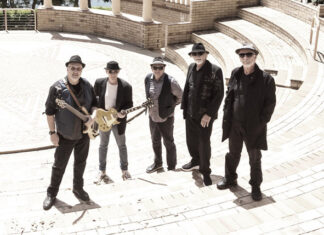Ultra-marathon veteran Pat Farmer knows a bit about pain, both as a runner and in his personal life. But he also knows how to overcome it.
As he climbed out of the Run For The Voice campervan in Noosa well before sunrise on the last day of July to begin Day 107 of his epic 14,400 kilometre run around Australia in support of the Yes campaign, the 61-year-old former federal Liberal politician was carrying a niggling soft tissue injury in the tendons in the top of his foot, the result of a hard day negotiating the hill descents around Bundaberg. “I don’t know how many ks I’m supposed to do today,” he said as he rolled into a pitstop at Peregian Beach an hour or so into a relatively light day (around 60 kilometres to Caloundra) in a gruelling schedule. “I don’t care anymore, all I know is I’ve got to put one foot in front of the other and get to the next place. For me it’s just a matter of getting through another day, one less to go. That’s how I deal with life – I break it down into bite-sized pieces, whether it’s running from North Pole to South Pole, across the Americas or around Australia.” Or surviving the tragic loss of his wife.
Sipping a recovery juice Pat tells Noosa Today: “When my first wife died 24 years ago when my children were very young, I came to the realisation that I needed purpose in my life, purpose beyond myself. I felt I needed to justify why I was still alive when good people were not. Since then I’ve tried to help worthwhile charities and causes and basically anyone needing help in whatever way I can. I’ve done that through politics and business and especially through my running career.”
Pat has in fact raised millions of dollars for causes over his endurance running career, including Lifeline, Cancer Council, the Red Cross, Diabetes Australia and the Nanhi Kali foundation in India, broken countless records for his 1999 round Australia run, and been awarded an Order of Australia for his contribution to running and charity. Along the way he found time to raise a daughter and son and served eight years in Federal Parliament as the Member for Macarthur in western Sydney.
On a trip to Thursday Island in Torres Strait in support of Diabetes Australia in his early political years, Pat was shocked by the standard of health care available to Islanders, which sparked a broader interest in Indigenous issues. He recalls: “I was a Liberal MP when the Sorry campaign started, and the ALP was pushing the idea that we should apologise. The Liberal response was that no we shouldn’t because it would cost the country a fortune, that businesses would go broke and people would lose their homes. These were all lies, and I had to sit in the parliament and listen to this tripe. When we lost the election in 2007, Kevin Rudd came in and apologised on behalf of the government to the Indigenous people of Australia for the stolen generation. The sky didn’t fall in, people didn’t lose their businesses or their homes and it didn’t cost a fortune. It cost nothing, but it began a healing process. I like to remind people that Peter Dutton, who wasn’t there to witness Sorry, later reflected that he regretted that absence. But here we are.”
Pat’s minder has warned me that the interview must be kept short because the runner must run, but in the talking stakes, Pat is only getting started. He continues: “I’m incredibly disappointed that my former party, the Liberals, have come out for No. I’m even more disappointed with the Nationals because they were first out of the block, saying no before there was any real information about what the proposal was. That means that their welded-on supporters are going to vote that way regardless of what the facts are, and that’s very sad. And the Libs, because it’s a coalition, have gone down the same path. They’ve politicised the issue, they’re the ones who have divided the nation.”
But despite gloomy recent polls, Pat is still optimistic that the Yes vote will get up. He told Noosa Today: “One of the great things about doing this run is that I hear what ordinary Australians are saying around the country, whether we’re in a caravan park or an Indigenous community or here in Noosa Shire, and that is people are fine with the Voice once they understand the question. But the negative response is that they want to hear the detail, and herein lies the problem. The best way to explain that was offered by [Yes figurehead] Thomas Mayo, who said: ‘It’s as simple as this – in the Constitution it says that the Commonwealth has the right to collect taxes. That’s all it says. Then you have to look at the legislation to determine how much tax and how it will be collected. That shows the difference between the Constitution and the legislative process, where it might go back and forth between the two houses until it passes or is thrown out. That’s what politicians do.’ The No campaign and the LNP have purposely muddied the waters on this, knowing full well how the process works because they deal with exactly this every day of the week, while most Australian people outside the political realm don’t know this.
“My gut feeling is that the Yes vote will win, not by a large margin but by enough. Why? Because I believe there is really very little opposition to the fundamental question. As long as the Yes campaign can get that point across, we will win.”
And for Pat, getting the point across means getting back on the David Low Way and continuing his heroic run, around the coastline to Adelaide and then up to Uluru in the Red Centre ahead of referendum day in mid-October.
To follow Pat’s progress, or to lend a hand with the funding, visit runforthevoice.com

